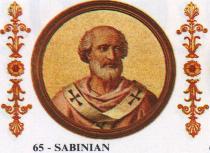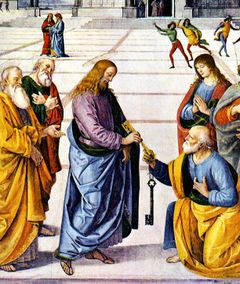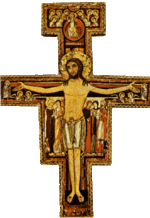Pope Sabinian
| Sabinian | |
|---|---|
 |
|
| Papacy began | September 13, 604 |
| Papacy ended | February 22, 606 |
| Predecessor | Gregory I |
| Successor | Boniface III |
| Personal details | |
| Birth name | ??? |
| Born | ??? Blera, Eastern Roman Empire |
| Died | February 22, 606 Rome, Byzantine Empire |
Pope Sabinian (died February 22, 606) was pope from 604 to 606. He was born at Blera (Bieda) near Viterbo. Pope during the Byzantine Papacy, he was fourth former apocrisiarius to Constantinople elected pope.
Apokrisiariat (?–597)
He had been sent by Pope Gregory I as Apostolic nuncio, to Constantinople, but he apparently was not entirely satisfactory in that office. He returned to Rome in 597.
Papacy (604–606)
He was consecrated pope probably on September 13, 604.
He incurred unpopularity by his unseasonable economies, although the Liber Pontificalis states that he distributed grain during a famine at Rome under his pontificate. The erudite Italian Augustinian Onofrio Panvinio (1529–1568) in his Epitome pontificum Romanorum (Venice, 1557) attributes to him the introduction of the custom of ringing bells at the canonical hours and the celebration of the Eucharist. The first attribution was this was in Guillaume Durand's thirteenth-century Rationale Divinorum Officiorum.
During his reign, Sabinian was seen as a counterfoil to Gregory. Whereas Gregory distributed grain to the Roman populace as invasion loomed, Sabinian sold it for high prices (though this may be a later interpolation by Gregory's biographers). The Liber Pontificalis praises him for "filling the church with clergy," in contrast to Gregory who rose rapidly from simple monk to become bishop of Rome.
References
![]() This article incorporates text from a publication now in the public domain: Chisholm, Hugh, ed (1911). Encyclopædia Britannica (Eleventh ed.). Cambridge University Press.
This article incorporates text from a publication now in the public domain: Chisholm, Hugh, ed (1911). Encyclopædia Britannica (Eleventh ed.). Cambridge University Press.
 "Pope Sabinian" in the 1913 Catholic Encyclopedia.
"Pope Sabinian" in the 1913 Catholic Encyclopedia.- Duffy, Eamon. Saints and Sinners: A History of the Popes, Yale University Press, 2001, p. 72–73. ISBN 0300091656
- Ekonomou, Andrew J. 2007. Byzantine Rome and the Greek Popes: Eastern influences on Rome and the papacy from Gregory the Great to Zacharias, A.D. 590–752. Lexington Books.
- Maxwell-Stuart, P. G. Chronicle of the Popes: The Reign-by-Reign Record of the Papacy from St. Peter to the Present, Thames & Hudson, 2002, p. 54. ISBN 0500017980.
| Catholic Church titles | ||
|---|---|---|
| Preceded by Gregory I |
Pope 604–606 |
Succeeded by Boniface III |
|
|||||||||||||||||||||||||||||||||||||||||||||
|
|||||||||||||||||||||||||||||||||||||||||

